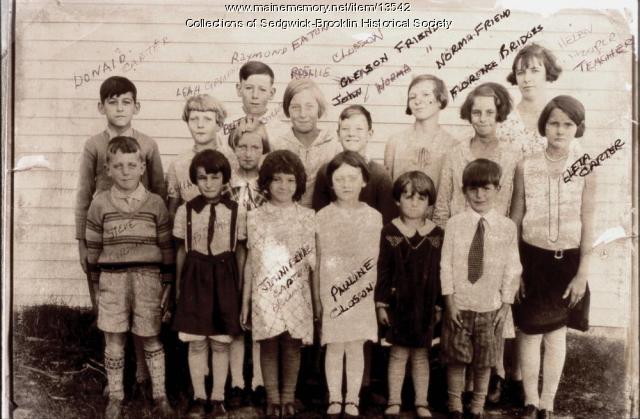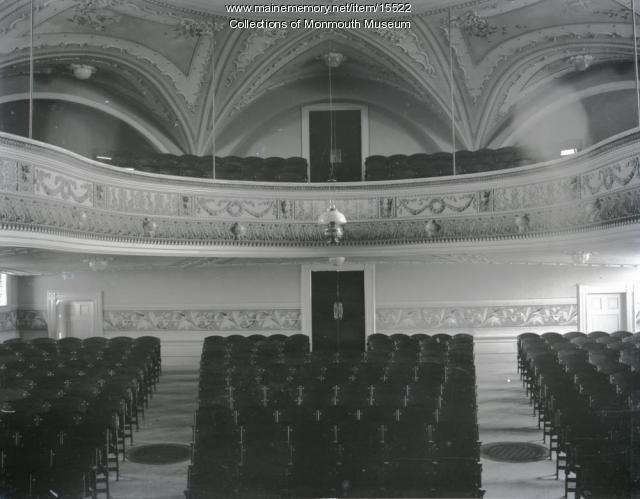Keywords: Town halls
- Historical Items (495)
- Tax Records (0)
- Architecture & Landscape (10)
- Online Exhibits (73)
- Site Pages (216)
- My Maine Stories (19)
- Lesson Plans (1)
Online Exhibits
Your results include these online exhibits. You also can view all of the site's exhibits, view a timeline of selected events in Maine History, and learn how to create your own exhibit. See featured exhibits or create your own exhibit
Exhibit
The Establishment of the Troy Town Forest
Seavey Piper, a selectman, farmer, landowner, and leader of the Town of Troy in the 1920s through the early 1950s helped establish a town forest on abandoned farm land in Troy. The exhibit details his work over ten years.
Exhibit
Student Exhibit: Bloomfield Academy
In 1842, the new Bloomfield Academy was constructed in Skowhegan. The new brick building replaced the very first Bloomfield Academy, a small wooden building that had been built in 1814 and served as the high school until 1871. After that, it housed elementary school classes until 1980.
Exhibit
A Town Is Born: South Bristol, 1915
After being part of the town of Bristol for nearly 150 years, residents of South Bristol determined that their interests would be better served by becoming a separate town and they broke away from the large community of Bristol.
Exhibit
Reading, Writing and 'Rithmetic: Brooklin Schools
When Brooklin, located on the Blue Hill Peninsula, was incorporated in 1849, there were ten school districts and nine one-room school houses. As the years went by, population changes affected the location and number of schools in the area. State requirements began to determine ways that student's education would be handled. Regardless, education of the Brooklin students always remained a high priority for the town.
Exhibit
Promoting Rockland Through a Stereopticon, 1875
Frank Crockett and photographer J.P. Armbrust took stereo views of Rockland's downtown, industry, and notable homes in the 1870s as a way to promote tourism to the town.
Exhibit
Waldoboro Fire Department's 175 Years
While the town of Waldoboro was chartered in 1773, it began organized fire protection in 1838 with a volunteer fire department and a hand pump fire engine, the Water Witch.
Exhibit
A fire and two men whose lives were entwined for more than 50 years resulted in what is now considered to be "the Jewel of Portland" -- the Austin organ that was given to the city of Portland in 1912.
Exhibit
Several Mainers have run for president or vice president, a number of presidents, past presidents, and future presidents have had ties to the state or visited here, and, during campaign season, many presidential candidates and their family members have brought their campaigns to Maine.
Exhibit
Home: The Longfellow House & the Emergence of Portland
The Wadsworth-Longfellow house is the oldest building on the Portland peninsula, the first historic site in Maine, a National Historic Landmark, home to three generations of Wadsworth and Longfellow family members -- including the boyhood home of the poet Henry Wadsworth Longfellow. The history of the house and its inhabitants provide a unique view of the growth and changes of Portland -- as well as of the immediate surroundings of the home.
Exhibit
From Sewers to Skylines: William S. Edwards's 1887 Photo Album
William S. Edwards (1830-1918) was a civil engineer who worked for the City of Portland from 1876-1906. Serving as First Assistant to Chief Engineer William A. Goodwin, then to Commissioner George N. Fernald, Edwards was a fixture in City Hall for 30 consecutive years, proving indispensable throughout the terms of 15 Mayors of Portland, including all six of those held by James Phineas Baxter. Edwards made significant contributions to Portland, was an outstanding mapmaker and planner, and his works continue to benefit historians.
Exhibit
Hermann Kotzschmar: Portland's Musical Genius
During the second half of the 19th century, "Hermann Kotzschmar" was a familiar household name in Portland. He spent 59 years in his adopted city as a teacher, choral conductor, concert artist, and church organist.
Exhibit
Civil War Soldiers Impact Pittsfield
Although not everyone in town supported the war effort, more than 200 Pittsfield men served in Civil War regiments. Several reminders of their service remain in the town.
Exhibit
These stories -- that stretch from 1999 back to 1759 -- take you from an amusement park to the halls of Congress. There are inventors, artists, showmen, a railway agent, a man whose civic endeavors helped shape Portland, a man devoted to the pursuit of peace and one known for his military exploits, Maine's first novelist, a woman who recorded everyday life in detail, and an Indian who survived a British attack.
Exhibit
Field & Homefront: Bethel during the Civil War
Like many towns, Bethel responded to the Civil War by sending many soldiers and those at the homefront sent aid and supported families. The town grew during the war, but suffered after its end.
Exhibit
Music in Maine - Radio Cowboys and Country Music
"… Music Hall of Fame by Ken Brooks, Board Chair, Hall of Fame Inductee 2012 Maine Country Music Hall of Fame & Museum Click to learn more about…"
Exhibit
Westbrook Seminary: Educating Women
Westbrook Seminary, built on Stevens Plain in 1831, was founded to educate young men and young women. Seminaries traditionally were a form of advanced secondary education. Westbrook Seminary served an important function in admitting women students, for whom education was less available in the early and mid nineteenth century.
Exhibit
Music in Maine - Country Music
"… played for over thirty years appearing in town halls and opera houses performing music, dance, and comedy in their act."
Exhibit
Music in Maine - Community Music
"Sometimes Grange halls served as town library and offered adult education. Leeds Grange Hall stage, 1975Leeds Historical Society The Grange…"
Exhibit
Music in Maine - Opera, Orchestras and Stages
"… community meeting spaces, theaters, town halls, and granges. A 1991 study showed at least 66 opera houses existed in Maine, from Presque Isle’s…"
Exhibit
Dressing Up, Standing Out, Fitting In
Adorning oneself to look one's "best" has varied over time, gender, economic class, and by event. Adornments suggest one's sense of identity and one's intent to stand out or fit in.
Exhibit
Lewiston, Maine's second largest city, was long looked upon by many as a mill town with grimy smoke stacks, crowded tenements, low-paying jobs, sleazy clubs and little by way of refinement, except for Bates College. Yet, a noted Québec historian, Robert Rumilly, described it as "the French Athens of New England."
Exhibit
Sagadahoc County through the Eastern Eye
The Eastern Illustrating and Publishing Company of Belfast, Maine. employed photographers who traveled by company vehicle through New England each summer, taking pictures of towns and cities, vacation spots and tourist attractions, working waterfronts and local industries, and other subjects postcard recipients might enjoy. The cards were printed by the millions in Belfast into the 1940s.
Exhibit
Port of Portland's Custom House and Collectors of Customs
The collector of Portland was the key to federal patronage in Maine, though other ports and towns had collectors. Through the 19th century, the revenue was the major source of Federal Government income. As in Colonial times, the person appointed to head the custom House in Casco Bay was almost always a leading community figure, or a well-connected political personage.
Exhibit
In Time and Eternity: Shakers in the Industrial Age
"In Time and Eternity: Maine Shakers in the Industrial Age 1872-1918" is a series of images that depict in detail the Shakers in Maine during a little explored time period of expansion and change.
























